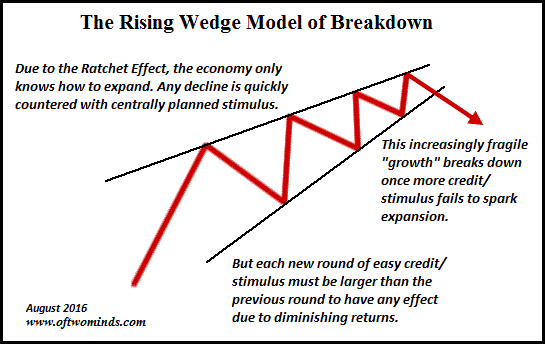The only question left for China (and every other debt/bubble-dependent nation) is what socio-political consequences will manifest when the credit bubble finally bursts?
In Asia, it's generally seen as unpatriotic to criticize one's country in public, even if you disagree with its direction and leadership. The cultural norm is to maintain the "face" of one's country by hiding its ills from outsiders.
This reticence is especially evident in China, which suffers from the memory of being subjugated by the Western imperialist powers in the late 19th century and early 20th century.
As a general rule, you will rarely hear any profound criticism of China unless you are considered a trusted friend; giving China a black eye in public is frowned upon, even by its domestic critics.
For this reason, the majority of the Western media has very little grasp of what worries Chinese people. Recently, I have heard fears of a Second Cultural Revolution being expressed in private.
There is a Great Divide between generations in China: on the one side is the older generation that remembers the Maoist era with some nostalgia and the terrible adversities of the Cultural Revolution (1966 - 1976). On the other side is the young educated, prosperous generation which has only known consumerist prosperity and personal advancement.
The ideals of the old communes are an abstraction to the young generation, as are the terrible costs of the Cultural Revolution.
A resurgence of devotion to Mao has caught authorities off-guard; they can't very well suppress public displays of secular worship of the Party's founder, but raising Mao's revolutionary ideals from the dustbin of history implicitly challenges the Party's current leadership.
The older generation resents the young consumer-obsessed generation, and some would like to purge China of the excesses of wealth and consumerism.
It's not too difficult to see how rising unemployment (
China's Hidden Unemployment Rate) and China's enormous wealth inequality could spark a new Cultural Revolution that would target Party leaders who have benefited from the state-managed neoliberal capitalism that has greatly enriched the leaders and their family dynasties.
In effect, a return to the party's Maoist roots would open divisive fissures in the Party and the nation. Farfetched? Perhaps not as much as the conventional sugar-coated media representation would suggest.
The status quo solution (in China, the U.S., Japan, the E.U., etc. etc.) to a weakening bubble-dependent economy is to inflate another even bigger bubble.If debt reached extremes that imploded, the solution is to expand debt far beyond the levels that triggered the implosion.
If fudging the numbers triggered a loss of confidence, the solution is to fudge the numbers even more, so they no longer reflect reality at all.
If the masses protest their powerlessness, the solution is to push them further from the centers of power.
And so on.
This blowing new bubbles to replace the ones that popped works for a while, but at the expense of systemic stability. Each new bubble requires pushing the system to new extremes that increase the risk of instability and collapse.
In other words, the stability of the new bubble is temporary and thus illusory.
The processes used to inflate the new bubble suffer from diminishing returns.The nature of stimulus-response is that overuse of the stimulus leads to diminishing responses. This is a structural feature that cannot be massaged away.
Goosing public confidence in the status quo with phony statistics and rigged markets works splendidly the first time, less so the second time, and barely at all the third time. Why is this so? The distance between reality and the bubble construct is now so great that the disconnection from reality is self-evident to anyone not marveling at the finery of the Emperor's non-existent clothing.
The system habituates to the higher stimulus. If the drug/debt has lost its effectiveness, a higher dose is needed. This is the progression of serial bubbles. Then the system habituates to the higher dose/debt, and the next expansion of debt must be even greater.
This dynamic can be visualized as The Rising Wedge Model of Breakdown, which builds on the well-known Ratchet Effect: the system is greased for easy expansion of debt, leverage, employees, etc., but it has no mechanism to allow contraction. Any contraction triggers systemic collapse.
The only question left for China (and every other debt/bubble-dependent nation) is what socio-political consequences will manifest when the credit bubble finally bursts?
The answer will arise from the unique interplay of history, social norms and central-state actions in each nation-state as the crisis deepens. In China, the two revolutions--the Communist victory of 1949 and the now-suppressed Cultural Revolution of 1966 - 1976-- will both loom large--perhaps far larger than the current regime would like.
This essay was drawn from Musings Report 28. The Musings Reports are emailed weekly to subscribers ($5/month) and major contributors ($50+ annually). If you'd like to support this blog, please consider subscribing (links below or in the right sidebar).
My new book is #9 on Kindle short reads -> politics and social science: Why Our Status Quo Failed and Is Beyond Reform ($3.95 Kindle ebook, $8.95 print edition)For more, please visit the book's website.
NOTE: Contributions/subscriptions are acknowledged in the order received. Your name and email remain confidential and will not be given to any other individual, company or agency.
|
Thank you, Catherine C.-F. ($20), for your splendidly generous contribution to this site-- I am greatly honored by your support and readership.
| |

























